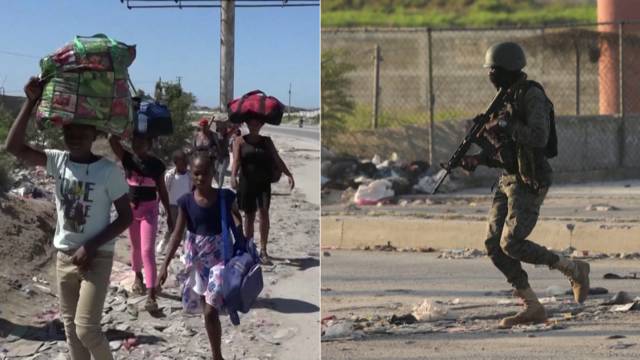
By Amy Goodman & Denis Moynihan
Haiti and Honduras have made headlines in the last few weeks. Honduras’ former president, Juan Orlando Hernández, was just convicted in a US court of drug trafficking. He faces life in prison. Haiti is a nation without a government, as armed groups have united against the US-backed, unelected Prime Minister installed after the assassination of their president in 2021. In both cases, what is missing from mainstream news coverage is the role of US intervention that brought them to this point.
“The crisis in Haiti is a crisis of imperialism,” University of British Columbia Professor Jemima Pierre, a Haitian American scholar, explained on the Democracy Now! news hour. In her NACLA Report article headlined, Haiti as Empire’s Laboratory, she describes her home country as “the site of the longest and most brutal neocolonial experiment in the modern world.”
Haiti was the world’s first Black republic, founded in 1804 following a slave revolt. France demanded Haiti pay reparations, for the loss of slave labor when Haiti’s enslaved people freed themselves. For more than a century, Haiti’s debt payments to France, then later to the US, hobbled its economy. The United States refused to recognize Haiti for decades, until 1862, fearful that the example of a slave uprising would inspire the same in the US.
In 1915, the US invaded Haiti, occupying it until 1934. The U.S. also backed the brutal Duvalier dictatorships from 1957 to 1986. Jean-Bertand Aristide became Haiti’s first democratically-elected president in 1991, only to be ousted in a violent coup eight months later. The coup was supported by President George H.W. Bush and later by President Bill Clinton. Public pressure forced Clinton to allow Aristide’s return in 1994, to finish his presidential term in 1996. Aristide was reelected in 2001.
“In 2004…the U.S., France and Canada got together and backed a coup d’état against the country’s first democratically elected president, Jean-Bertrand Aristide,” Jemima Pierre continued. “The U.S. Marines…put him on a plane with his security officials, his wife and aide, and flew them to the Central African Republic.”Democracy Now! traveled to C.A.R. in 2004 covering a delegation led by Transafrica founder Randall Robinson and U.S. Congressmember Maxine Waters who defied US policy and escorted the Aristides back to the Western Hemisphere. Aristide confirmed to Democracy Now! then that he had been ousted in a coup d’état backed by the United States. Aristide then went to live in exile in South Africa for the next seven years.
In response to allegations that gangs are currently controlling Haiti, Professor Pierre said, “The so-called gang violence is actually not the main problem in Haiti. The main problem in Haiti is the constant interference of the international community, and the international community here is, very explicitly, the U.S., France and Canada.”
The Biden administration is reportedly now considering the transfer of Haitian asylum seekers to the controversial U.S. Navy base at Guantanamo Bay, Cuba – a repeat of some of the worst U.S. policies in its long history of exploitation of Haitians.
Honduras, meanwhile, currently has a democratically-elected president, Xiomara Castro. Her husband, Manuel “Mel” Zelaya, was elected president in 2006, then ousted in a US-backed coup in 2009. In the following years, Honduras descended into a narco-state, forcing hundreds of thousands to flee violence, seeking asylum in the United States and elsewhere.
In 2013, Juan Orlando Hernández was elected president amidst allegations of campaign finance violations, then again in 2017 in an election widely considered fraudulent. Shortly thereafter, his brother Juan Antonio Hernández was arrested in Miami for drug trafficking. Then, following Xiomara Castro’s election, Juan Orlando Hernández himself was arrested and extradited to the US for cocaine trafficking. On March 8th, he was convicted in US federal court, and is currently awaiting sentencing.
“The evidence was chilling,” history professor Dana Frank, who was in the courtroom, said on Democracy Now! “This litany of assassinations of prosecutors, assassinations of journalists, corruption of the police, the military, politicians, the president, his brother, you name it. And it was like the curtain was drawn back, and you could see the day-to-day workings of this tremendous violent, corrupt mechanism that was the Juan Orlando Hernández administration…this was what happened after the 2009 coup that opened the door for the destruction of the rule of law in Honduras.”
US intervention in Haiti, Honduras and other countries is one of the principal drivers of people seeking asylum in the United States, as they flee violence, poverty and persecution at home. This point is almost never mentioned in the US press. To understand and ultimately solve the “immigration crisis,” Americans need to understand what their government has long done in their name, with their tax dollars–arming and propping up brutal regimes abroad.











Media Options